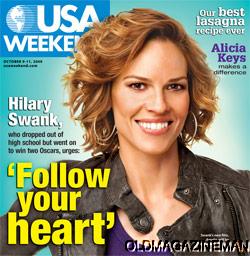The girl from a trailer park who dropped out of high school, is sitting pretty.
Weeks before her new movie, “Amelia,” even hits theaters, the studio clearly hopes that she’ll win an astonishing third best actress Oscar for her role as the adventurous pilot Amelia Earhart, who was famous in the 1920s and ’30s. (However, she probably will have to ward off Oscar juggernaut Meryl Streep, her idol.)
Would anyone be able to scan it for us ?

At the moment, Swank appears poised and ready for whatever’s next. The day we meet at her favorite Thai place, a casual restaurant near Malibu, she’s comfortable in jeans and a tank top but a tad jet-lagged, thanks to the previous day’s flight back from Italy.
She spent the past month vacationing with an extended famiglia that included her mother, older brother, sister-in-law, nephews, a niece, her boyfriend of several years (Hollywood agent John Campisi), his young son and other family members.
“I’m learning to speak Italian,” she says, explaining the folder of language lessons on the table.
For Swank, self-education is serious business. And, given that she left school at age 15, much of it has been on the job. She famously learned to pass as a man for 1999’s “Boys Don’t Cry” (Oscar No. 1) and to box like a pro for 2004’s “Million Dollar Baby” (No. 2). For her new biopic about Earhart opening in two weeks, Swank did what she thought it would take to play the legendary aviator: She learned to fly, although she is just short of getting her pilot’s license.
Swank also pored over newsreels, news clippings and, to get her manner of speaking right, 16 minutes of recordings with Earhart’s voice. As Swank puts it: “I like the psychology of my job, the breaking down of the character. I like to find the differences in people and the similarities.”
“Amelia” director Mira Nair believes the star’s similarity to the iconic aviator goes beyond the physical, which itself is remarkable when you see Swank in a flight jacket and cap on the big screen. “Both ‘Amelia’ and Hil refuse to take no for an answer, and they find a graceful way to get what they want by being incredibly focused and quietly better than anyone at the game,” Nair says.
Swank’s work ethic was ingrained into her early on. Her mother told her “can’t” was a word she should not say. “It was like a four-letter word in our house,” she says. “My mom said, ‘You can. You just have to set your mind to it.’ What that did for me was take away the idea that I couldn’t accomplish something. It made me look for the ways I could do it, whether that meant train harder or work harder.”
It hasn’t been easy, for sure. The actress paid her dues in the 1990s with parts in TV’s popular hit “Beverly Hills, 90210” (from which she was dumped after 16 episodes) and the movie version of “Buffy the Vampire Slayer.” She earned just $3,000 for “Boys Don’t Cry,” and when she won her Oscar for it, she had no health insurance. She has weathered her share of critical clunkers, most recently the 2007 romantic drama “P.S. I Love You.”
Still, Swank remains on Hollywood’s A-list, although it has been a challenge for her to accept the financial rewards. “When you grow up with a difficult childhood — everything is work, work, work — it takes time to learn that it’s OK now that you have a nice house, you make a nice living, you eat well,” she says. She recalls the time she was shopping with a friend and realized she actually could buy the expensive bag she was admiring and still buy groceries. But did she? “No. I didn’t need it. I’d rather spend my money on traveling and my family.”
Now 35 and dating, she says she wants kids but is oblivious to the Hollywood baby boom going on around her. “I don’t read magazines,” says Swank, who split from her husband of eight years, actor Chad Lowe, in 2006. She points to best friend Mariska Hargitay of TV’s “Law & Order: SVU,” who had her son at 42, as evidence that there’s no hurry to have children. “When the time is right,” Swank says of her own plans.
She also cites her new inspiration. “[Earhart] encouraged women to follow their dreams and follow their hearts, even if that was out of the home, out of having children and out of getting married,” Swank says. “She didn’t discourage women from having a family, but she also really tried to encourage them to see the world a little first. She was saying, ‘You can have it all. You don’t have to do it in someone else’s time frame.’ ”
Obviously, Swank is setting her own schedule, and when it comes to her work, it’s an ambitious one. She started a production company (she’s a producer on “Amelia”) to develop new projects. That’s a good move, director Nair says: “Some of the smartest women I know — Reese [Witherspoon], Hilary, Uma [Thurman] — look for material they can play. It’s the only way.”
It’s an idea Earhart encouraged. As she once said, “The woman who can create her own job is the woman who will win fame and fortune.” And, Swank might add, gain a remarkable education.
Source :http://www.usaweekend.com/
